Iran frees detained German citizen accused of spying - reporter

Mark Kaufman, a German national detained in Iran in June on suspicion of espionage has been freed under conditional pardon, journalist Kambiz Ghafouri told Iran International.

Mark Kaufman, a German national detained in Iran in June on suspicion of espionage has been freed under conditional pardon, journalist Kambiz Ghafouri told Iran International.
“Iranian judicial and security officials directed Kaufman to submit a conditional release request. He was removed from prison and fully released on Thursday,” Ghafouri told Iran International on Friday.
Ghafouri, a veteran investigative journalist who has reported previously on undisclosed developments within Iran's security establishment and who broke the news via a post on X, said Kaufman remained in Iran.
No official Iranian media has reported the release, and the German Foreign Ministry did not immediately respond to an Iran International request for comment.
Iranian media reported in June that Kaufman had been arrested on alleged spying charges near restricted nuclear and military sites in Markazi province.
State news agency Mehr released a video they say showed Kaufman, describing him as a Jewish-German dual national tourist cycling through the region, speaking after his arrest.
In the footage, Kaufman says he was aware he was near a military area and that taking photos or videos was not allowed. He adds that he sent his location to a friend. The video is heavily edited and does not include a clear confession.
Iranian officials accuse Kaufman of gathering intelligence on sensitive military sites, including missile silos, drone routes and airbases.
Mehr said he was detained by Islamic Revolutionary Guards Corps (IRGC) intelligence operatives in an area marked with warning signs.
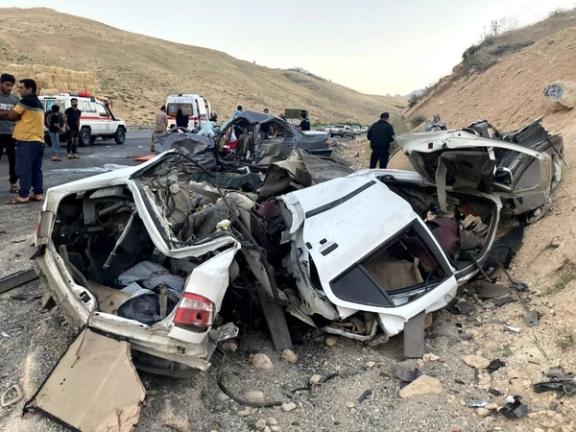
Iran recorded more than 20,000 road deaths in the past year, marking the highest toll in more than a decade, an official of the country’s forensics authority said on Thursday.
The sharp rise, officials say, reverses ten years of gradual decline in traffic deaths and reflects the country’s worsening vehicle safety, outdated road networks, and weak enforcement of driving standards.
The figure broke a ten-year record, with fatalities exceeding 20,000 for the first time since 2011, Abbas Masjedi, head of the Legal Medicine Organization, told Dideban Iran.
“Unfortunately, last year, for the first time in ten years, we recorded more than 20,000 deaths caused by traffic accidents,” Masjedi said. “During the previous decade, the figure always stayed below that mark. After the pandemic, travel increased again, and the number of deaths rose as a result,” he said.
Nearly half a million people, Masjedi added, were injured in crashes last year, with 7 to 10 percent suffering permanent disabilities. He described the losses as “a heavy burden on the national healthcare system and public funds,” estimating that the lifetime cost per serious injury could reach 90 billion rials (nearly $90,000).
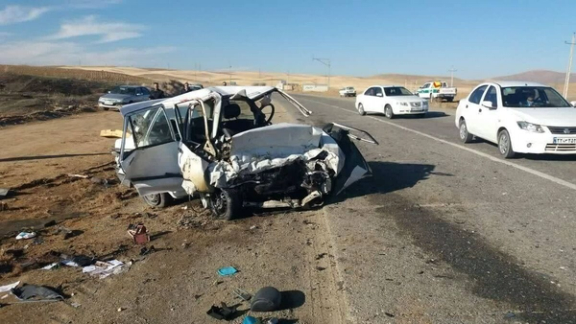
Road safety analysts attribute the surge not only to driver error but also to systemic failures – notably the poor quality of domestically produced vehicles and long-neglected accident-prone roads. Studies have shown that Iranian-made cars routinely fail crash safety standards, turning even minor collisions into deadly incidents.
Large sections of Iran’s intercity network, particularly the northern and southern corridors, lack basic safety features such as guardrails, lighting, and warning signs, according to the Legal Medicine Organization. Urban centers like Tehran, where traffic density is among the highest in the region, also account for a growing share of fatal accidents.
Preventive spending urged
Masjedi urged authorities to redirect more funding from emergency response to prevention, including upgrading road infrastructure and improving vehicle safety.
“Investment in prevention is worth every rial,” Masjedi said. “If we fix these dangerous points and improve vehicle quality, we can save thousands of lives each year.”
The latest figures highlight the human and economic toll of road accidents in Iran, where transport safety has long lagged behind international standards despite repeated government pledges to reduce fatalities by 10 percent annually.
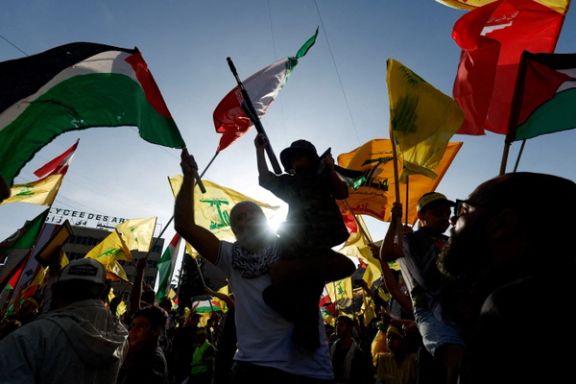
Iran-backed Hezbollah is rebuilding its weapons and ranks, defying a cease-fire deal and risking renewed conflict with Israel, the Wall Street Journal reported on Friday, citing people familiar with Israeli and Arab intelligence.
The intelligence shows Hezbollah is restocking rockets, antitank missiles and artillery through seaports and smuggling routes that still operate in parts of Syria, the people said. Some of the new weapons are made in Lebanon by Hezbollah itself, one of the people said.
The rearmament defies the terms of the cease-fire agreement that required Lebanon to begin disarming Hezbollah south of the Litani River. Instead, Hezbollah has resisted, saying its weapons are essential to defend Lebanon’s sovereignty.
Israel, which has provided intelligence to help Lebanese forces disarm Hezbollah and carried out more than 1,000 strikes against the group since last November, is growing impatient, the people said. One person familiar with the matter said the Israeli government was angered to learn the issue had shifted from disarmament to rearmament only months after the truce began.
US Ambassador to Turkey Tom Barrack said in October that Israel could act unilaterally if Beirut delays further, warning of grave consequences. Lebanese leaders have appealed for patience through American and Arab intermediaries and signaled willingness to expand coordination with Israel despite the two states remaining technically at war.
Hezbollah leader Naim Qassem said in a recent television interview that attempts to disarm the group should be resisted but that it seeks to avoid another war. He said Hezbollah has not retaliated to Israeli strikes since the truce began.
The cease-fire followed a two-month Israeli campaign last year, triggered when Hezbollah fired rockets into Israel after Hamas’s 2023 attack. Thousands of airstrikes crippled the group’s infrastructure and killed many of its commanders.
Hezbollah deepens ties in Latin America as Iran faces strain
While Hezbollah rebuilds its military power at home, the group is also reinforcing its global funding base.
US experts told senators last week that Hezbollah is expanding its financial and criminal networks in Latin America, particularly in Venezuela, as Iran struggles under economic pressure. Matthew Levitt, a terrorism analyst, said Hezbollah has long relied on diaspora and illicit trade networks to raise money when funding from Tehran slows.
Lawmakers warned that Venezuela has become a hub for Hezbollah’s drug and finance operations. Senator Sheldon Whitehouse said the group is “one of Iran’s tools to destabilize and terrorize,” urging stronger action to cut its financial lifelines. Others called on Latin American governments to follow Argentina, Colombia, and Paraguay in designating Hezbollah as a terrorist group.
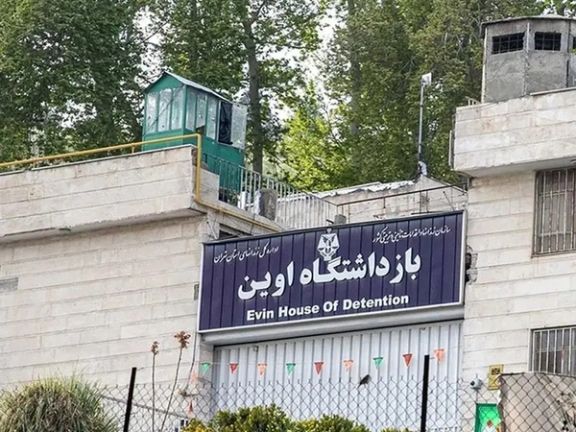
The Independent International Fact-Finding Mission on the Islamic Republic of Iran set up by the United Nations said on Thursday that human rights were increasingly under attack following a June war with Israel and the United States.
There was "a serious deterioration of the human rights situation in Iran following Israeli airstrikes in June, succeeded by a domestic crackdown that has further constricted civic space, undermined due process, and eroded respect for the right to life," the mission said in a report.
Its release was timed with the publication of similar findings by the UN Special Rapporteur on human rights in Iran, Mai Sato.
The investigators faulted Israel for a June 23 attack on a notorious Iranian prison which authorities say killed "80 people, including prisoners, their family members, staff and at least one child," the report said.
"The Mission’s preliminary investigations indicate that the airstrikes struck civilian buildings in the prison complex," it added, "which do not constitute legitimate military objectives, and that the strikes on these buildings were likely intentional."
Iran's actions following the strike were also criticized, with the report alleging prisoners were transferred to other facilities were beaten and moved at gunpoint, adding that one female detainee reportedly died.
It urged an Iranian investigation on "any violations that may have occurred prior to, during and following the strikes." It said Iran had responded to the mission's request for information on the attacks but Israel had not.
21,000 people detained by authorities in the wake of the conflict include "lawyers, journalists, human rights defenders, and people who expressed their views on the conflict on social media," the mission said.
The rise in executions this year in Iran to the highest levels since 2015, it added, "appear to contravene international human rights law, thereby violating the right to life" for which judges could be held to account for crimes against humanity
It rapped Iran for what it called extraterritorial violation of rights by surveilling and intimidating dissidents abroad.
"These patterns appear to form part of a recurring system of repression," it said, "underpinned by systemic impunity."
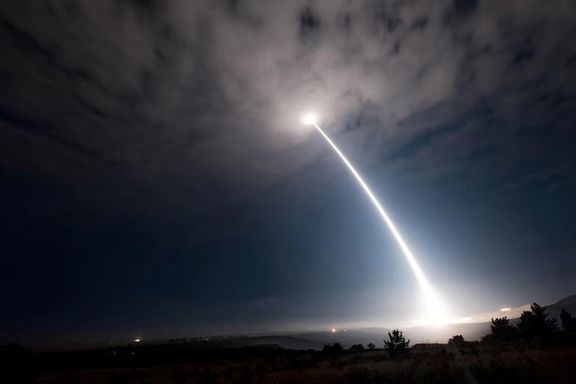
Iran's foreign minister on Thursday torched a decision by US President Donald Trump to resume nuclear weapons tests after 33 years, saying the move exposes American bullying and hypocrisy after US attacks on Iranian nuclear sites in June.
"Having rebranded its “Department of Defense” as the “Department of War”, a nuclear-armed bully is resuming testing of atomic weapons," Abbas Araghchi said on X on Friday, citing a social media post by Trump earlier yesterday.
Trump cited the arsenals of Russia and China as well as nuclear tests by unspecified other countries for ordering instructing the "Department of War" he recently rebranded to "start testing our Nuclear Weapons on an equal basis."
Arch-foes since the 1979 Islamic Revolution and Tehran hostage crisis, Iran and the United States have been locked in a tense standoff in the energy-rich Mideast for decades but relations exploded into open conflict in June.
Two months after the start of US-Iran talks aimed at resolving an impasse over Tehran's disputed nuclear program, Israel launched a surprise military campaign on Iran capped by US strikes on three key Iranian nuclear sites.
Iran denies seeking nuclear weapons and relations have soured in recent weeks as a diplomatic solution appears elusive.
"The same bully has been demonizing Iran's peaceful nuclear program and threatening further strikes on our safeguarded nuclear facilities, all in blatant violation of international law," Araghchi added.
"Make no mistake: The U.S. is the World’s Most Dangerous Proliferation Risk The announcement of a resumption of nuclear tests is a regressive and irresponsible move and a serious threat to international peace and security."
Iran's economic woes and isolation have deepened since European-triggered UN sanctions resumed last month despite Chinese and Russian efforts to ban the maneuver codified by a mostly defunct 2015 nuclear deal Trump quit.
"The world must unite to hold the U.S. accountable for normalizing the proliferation of such heinous weapons," Araghchi said.
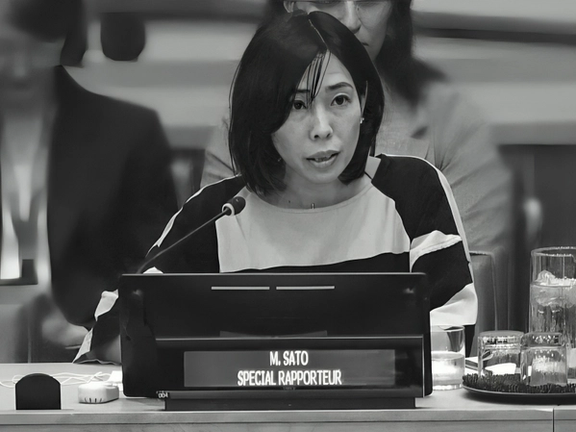
The UN Special Rapporteur on human rights in Iran said on Thursday that Israel likely violated international law in its military campaign in June while Tehran expanded repression after the conflict with hundreds of executions and new curbs on dissent.
The report by Mai Sato, dated August 26 and presented to the UN General Assembly on Thursday, covered developments from January to July 2025.
It described a “deeply troubling deterioration” in human rights, citing arbitrary detention, torture, discrimination and other forms of state violence.
Israeli attacks 'violated key principles' of international law
The report said Israeli and US attacks between June 13 and 24 on Iran’s military, nuclear and civilian infrastructure—including Evin Prison in Tehran—killed about 1,100 people, including 102 women and 45 children, and injured more than 5,600.
The report added that non-state sources estimated between 40% and 60% of those killed were civilians.
"Israel attacked over 210 commercial centers, 16 educational centers, 17 energy installations, nearly 10,000 residential units and 23 medical facilities, including hospitals in Kermanshah and Tehran," the report asserted.
"Core tenets of international humanitarian law appear to have been violated, namely, the need to distinguish between combatants and non-combatants, ensure the proportionality of military actions and minimize foreseeable harm to civilians and civilian infrastructure," Sato wrote.
Israeli assassinations of 14 nuclear scientists she described as "unlawful killing."
Attacks by Israel and the United States which both powers lauded as key setbacks for their Mideast adversary and a boon to international security she condemned.
"The Special Rapporteur underscores that armed attacks on nuclear facilities must never occur, as they could release radioactive material with catastrophic humanitarian and ecological impacts."
The attacks prompted Iran’s parliament to suspend cooperation with the International Atomic Energy Agency (IAEA) and introduce laws expanding espionage offences and limiting the work of journalists and civil groups.
'Alarming' rise in Iran executions
Sato said Iran’s use of the death penalty reached “alarming” levels, averaging three to four executions a day.
More than 700 people were executed during the reporting period, including at least 98 Baloch, 42 Kurds, and 8 Arabs, along with a rise in executions of Afghan nationals.
Half of the executions were for drug-related offences, followed by homicide and “security-related” charges, including espionage for Israel.
Sato said executions were carried out amid “procedural violations” and that the authorities had made public only 8% of the total cases, leaving most unacknowledged.
Torture, amputations and prison abuse
The report detailed accounts of torture, sexual violence and the denial of medical care in detention. It cited the amputation of four fingers each from three men convicted on theft charges — Hadi Rostami, Mehdi Sharafian and Mehdi Shahivand — at Urmia Central Prison in July as “state-sanctioned mutilation.”
Following Israeli strikes on Evin prison on June 23, which killed about 80 people, prisoners were transferred to overcrowded and unsanitary facilities, the report said, adding that the whereabouts of several detainees remained unknown.
Crackdown on media and activists
Sato said authorities had detained over 21,000 people during the June escalation, amid what she described as a “massive clampdown on civic space.”
The judiciary also sent text warnings threatening prosecution for citizens who engaged with what it called “Zionist regime pages” on social media.
The report said journalists working for Iran International and BBC Persian continued to face death threats and harassment of their families inside Iran.
Kurdish rights group Hengaw Organization for Human Rights, the report added, was repeatedly targeted with "smear campaigns, threats, false legal accusations, attempted abduction and death threats".
Minorities and deportations
The report highlighted systemic discrimination against the Baha’i, Kurdish, Baluch, and Arab ethnic minorities as well as Afghan refugees, including arbitrary arrests and the mass deportation of over 1.5 million Afghans during the first half of the year.
It said the revival of the mandatory hijab enforcement law and new surveillance powers further restricted freedoms, while lawyers, activists and women’s rights defenders faced imprisonment and unfair trials.
Lethal violence beyond war
Sato said Iran’s human rights violations go far beyond the June conflict, forming what she described as a years-old “broader pattern of lethal violence”.
She cited as evidence extrajudicial killings along Iran’s borders, deaths in custody, a culture of impunity for state violence and laws that permit gender-based abuse.
“Violations of the right to life are manifested in multiple forms,” the report said, adding that between 11 and 17 Kurdish border couriers, known as Kulbars, were killed and up to 22 injured during the reporting period.
At least 71 fuel porters or sukhtbars were also killed and 54 wounded in Sistan and Baluchestan Province in Iran's Southeast. Landmine explosions killed continued to take lives among both vulnerable border communities, it added.
'No relief'
Sato urged Iran to repeal laws criminalizing peaceful expression, end the use of torture and forced confessions, and investigate deaths in custody and border killings.
Foreign governments, she said, must protect Iranian exiles, human rights defenders and journalists from cross-border harassment and support civil society groups documenting abuses.
“Post-conflict periods present critical opportunities for national unity and healing,” Sato said. “Yet in the Islamic Republic of Iran, the end of fighting has not brought relief for the people.”